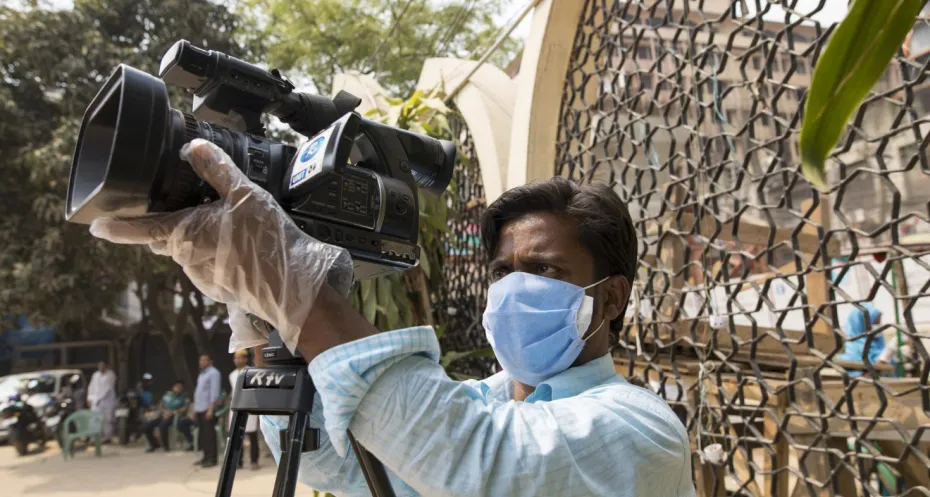Independent journalism and media in even direr straits since Covid-19

Since the start of the pandemic, we expressed our deep concerns about the effects on media and journalists worldwide. The health crisis has in many cases further aggravated the situation of journalists who were already vulnerable. Since the start of the pandemic, the pressure on journalists has increased; emergency measures have been accelerated by many governments, and access to information has been further restricted. Two months later, the independent media are in crisis: the repression has continued and it remains to be seen whether independent journalism will (financially) survive Covid-19.
The importance of reliable information
Access to reliable information is crucial in times of crisis. Accessing reliable and factual information in time can literally save lives. In this health crisis, it is more important than ever that governments' policies are critically scrutinized. However, this is becoming more and more difficult as pressures on the media and journalists are increasing in many countries.
Bankruptcies in the media sector
Many independent journalists and media houses are also on the verge of bankruptcy because a large part of their income from advertising spaces is lost. In addition, many local journalists and freelancers struggle to find work, which leads to a further reduction of a pluralistic and critical media landscape.
Physical threats and violence
Journalists are increasingly confronted with physical threats and violence. For example, journalists worldwide are increasingly restricted in their freedom of movement, which hinders or even makes it impossible to perform their work. In Aruba, for example, an independent journalist was recently arrested and interrogated when she was doing her work during the curfew. An employee of our partner in Venezuela was also arrested for collecting protective equipment packages from Free Press Unlimited. We also see that journalists are physically banned from press conferences. This happened, for example, in Serbia, Macedonia, the Philippines and Florida.
Moreover, journalists are increasingly physically threatened and even attacked. Journalists were attacked by police and security forces in Uganda, Kenya and India. In addition, journalists regularly fall victim to violence by demonstrators, as was the case in Germany and Bolivia.
Increasing arrests
Journalists are increasingly being arbitrarily arrested, detained or indicted for publishing information that does not satisfy the authorities. This often results in lengthy legal processes, which also entail high costs. Currently, more than 130 journalists have already been arrested or otherwise engaged in legal proceedings.
Fake news laws
Many countries are accelerating fake news laws that criminalize the distribution of "false information" about Covid-19. Such laws are often passed by decree under a declared state of emergency. Journalists can be arrested or prosecuted under the pretext of combating Covid-19. The fake news laws are undoubtedly linked to the worldwide increase in arrests of journalists. For example, several journalists have already been prosecuted in Iran, Belarus, Niger, Hungary, Turkey and Swaziland under such legislation. It is unclear with many fake news laws whether this legislation will remain in force after the emergencies have ended. We are concerned about the long-term effects that far-reaching restrictions on press freedom under the pandemic will have on independent journalism. It is essential that such fake news laws are reversed.
What does Free Press Unlimited do during Covid-19
Free Press Unlimited and its partners are committed in more than 40 countries to continue to provide the population with reliable information, despite mounting pressures on media and journalists during Covid-19. Through our funds such as the Legal Defense Fund (for legal support for journalists) and Reporters Respond (the emergency fund for journalists), we support media and journalists worldwide with:
- Protection materials so that they can report safely on Covid-19. To date, we have helped over 2,400 journalists in countries including Venezuela, Indonesia, Iraq, Somalia and Bosnia and Herzegovina;
- Legal support to journalists who are charged or arrested for reporting on Covid-19, including in the Sahel, Central America and the Horn of Africa;
- Psychosocial support to journalists in, among others, the Balkans;
- Digital protection such as VPNs and webcam protection against monitoring by repressive regimes, such as in North Macedonia;
- Relocation against violent threats from oppressive regimes.
We also started the campaign: Together for Reliable Information, in which we highlight the importance of reliable information worldwide through stories and podcasts. In addition, we participate in a weekly live-streamed program by Pakhuis de Zwijger, Emerging Stories, about the effect of Covid-19 on journalism.
Photo by Zakir Hossain
